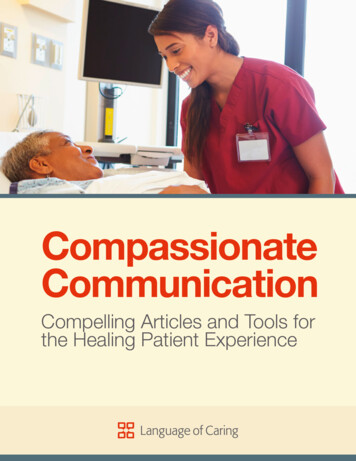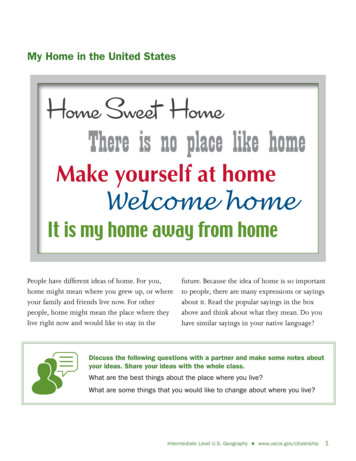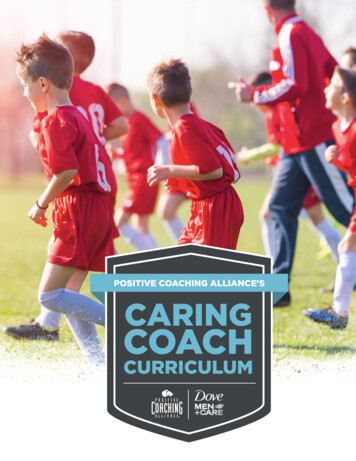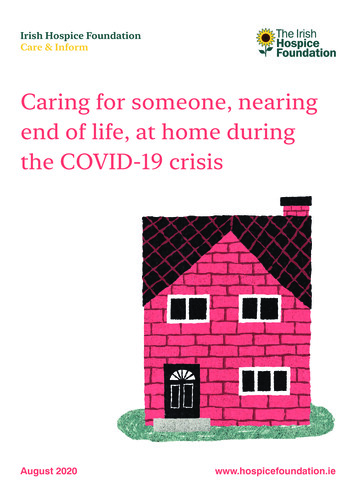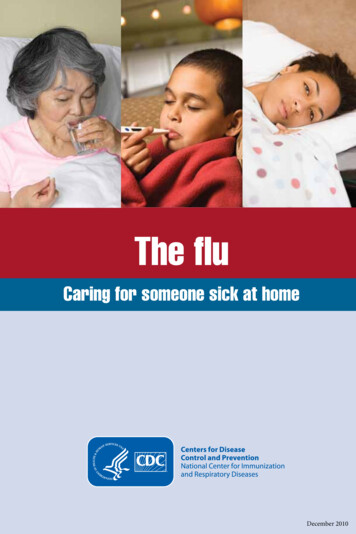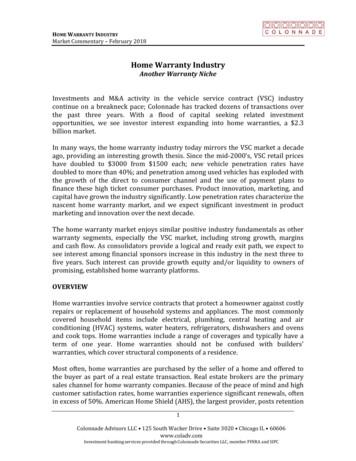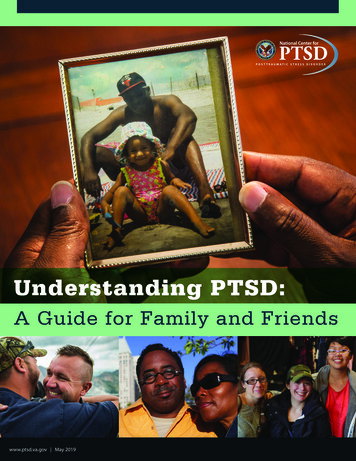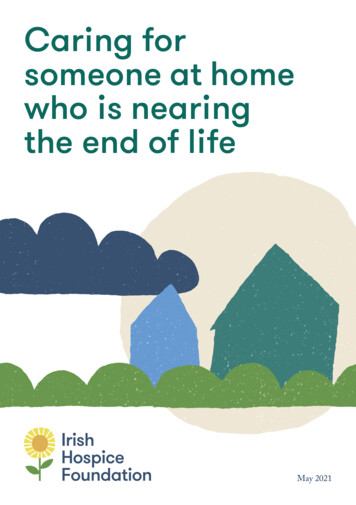
Transcription
Caring forsomeone at homewho is nearingthe end of lifeMay 2021
Irish Hospice Foundation has made every effort to ensure the informationcontained in this resource is accurate and up to date. It is not intended as asubstitute for medical advice, services, diagnosis and/or treatment.
Contents01. Introduction . 102. S taying connected with your GP andcommunity-based healthcare professionals . 303. Supporting the person who is dying at home . 504. What to expect if someone is dying at home . 705. Specific considerations for visitors during COVID-19 . 806. Caring for yourself . 1007. Planning ahead . 1208. Answers to COVID-19 questions you may have . 14Useful resources . 16
01.IntroductionMuch of the information here has been adapted from the booklet,When someone you care about is dying in hospital – What to expect.It contains information about the physical changes that happen as a personis dying. You can find it on our website www.hospicefoundation.ie.We have used the information here from what’s available from theHealth Service Executive (HSE) and our Hospice Friendly HospitalsProgramme (HFH). We’ve also consulted with our Primary PalliativeCare Steering Committee, the Irish College of General Practitioners,clinicians, Care Alliance Ireland, and the All-Ireland Institute ofHospice and Palliative Care Voices4Care group, to ensure all theinformation is accurate and reliable.If someone you know is living with a terminal illness, you may beconcerned about many things, including COVID-19. If there’sanything worrying you, or the person you’re caring for, talk toa healthcare professional like your GP, Public Health Nurse orCommunity Social Worker. You might be concerned that now isn’ta good time to do this, however, services are still operating, and GPscan be contacted by phone.1Caring for someone at home who is nearing the end of life
Tips on staying in contact with your GP and other community-basedhealthcare professionals are included in this booklet. This is followedby practical information about providing end-of-life care in yourhome. We also provide answers to some of the questions you mighthave about caring for someone at home who is nearing the end of lifeduring COVID-19.2
02.Staying connected withyour GP and communitybased healthcareprofessionalsIt’s important to stay connected with the healthcare professionalswho can support you. Have you contacted your GP, Public Health Nurse and/or thelocal Community Specialist Palliative Care team? Have you let your GP know what’s happening and what supportyou need? Your GP can provide advice on managing pain andother common symptoms at the end of life. Do you know the best hours to contact your GP? It’s best tocontact them earlier in the day rather than later, as you’re mostlikely to make contact with them that way, and also as contacthours may be reduced because of COVID-19. Do you know how to contact the GP Out-of-Hours service? Tryto contact your own GP first, if possible. Remember if an emergency occurs, dial 112 or 999.3Caring for someone at home who is nearing the end of life
Have you contacted your Pharmacist about the medicationsyou’ll need at home? Ask about home deliveries too. Your GP orPharmacist will help with keeping a regularly updated list of allmedications at home, which is important. Have you asked the Public Health Nurse or CommunitySpecialist Palliative Care Team about getting other supplies andequipment you may need, like incontinence wear? Consider asking your GP to send you any relevant informationto keep in the home. This might include a list of medications,Summary Medical History and a Care Plan.How can I get Specialist Palliative Careservices at home?Your GP and Public Health Nurse are your most importanthealthcare resources. They are continuing to provide care, advice andsupport during COVID-19.Your local Community Specialist Palliative Care Team can offeradvice about end-of-life care. Your GP or Public Health Nurse canput you in touch with them, after they have talked with the personliving with the illness and/or their carer(s).4
03.Supporting the personwho is dying at homeOther supports are available to help people who are nearing the endof life at home. These include our free Nurses for Night Care service(for people with illnesses other than cancer who wish to die at home)and the Irish Cancer Society’s free Night Nursing service (for peopledying at home with cancer).Information about Nurses for Night Care and the Night Nursingservice are available below: Irish Hospice Foundation Nurses for Night Care Service:www.hospicefoundation.ie Irish Cancer Society Night Nursing Service: www.cancer.ie5Caring for someone at home who is nearing the end of life
You might also find our resource, Practical Information: Caringfor someone at the end of life at home helpful. It’s available on ourwebsite. www.hospicefoundation.ieBeing with a person who is dying at home If you’re well yourself, it’s good to sit in the room with theperson and continue to speak to them and to have conversations,if they’re interested. Sitting with the person and listening is very important. Carefullistening helps the person who is dying share their feelings. Itmay also help you understand their concerns. Be respectful of what the person says. Try not to brush them offor change the topic. Most people just want to be listened to as they express theirhopes and fears. They may also just want to know they are notalone. If they can respond, provide the person with a phone, iPad/tabletto allow them to stay connected. Even if they can’t respond, theymay enjoy being able to see or hear people who contact them. Some people might need to be transferred to a hospital, hospiceor nursing home at the end of life, due to changing medicalneeds. This can be upsetting but could also be the right thing foreveryone.6
04.What to expect if someoneis dying at homeCaring for a dying person at home is very rewarding, but it can alsobe very hard.Things to consider as a person is dying: When close to dying, many people stop wanting to eat or drink,their lips and throat can sometimes get dry. This is normal, but itcan be upsetting for those who care about them. You can help themby gently wetting their mouth and lips. Applying a lip balm can alsohelp. This will usually be enough to keep the person comfortable. Sometimes the person who is dying can become restless. They may beanxious, or make repeated movements like pulling at their blankets orclothes. This is usually because of physical changes in the body. The person’s hands and feet may feel cold and may change colour.This is because their heart is sending blood to the vital parts of thebody, and isn’t reaching their arms and legs. You can put extra blanketsover the person’s hands and feet to keep them warm and comfortable. They may spend more time sleeping. When they’re awake, theymay be tired and sleepy, with little energy. They may not want tospeak. They may slip in and out of consciousness. This is normal. As they become evidently weaker and tired, it’s a good idea to limitand reduce visiting.(HSE & IHF, 2018 When someone you care about is dying in hospital – What to Expect)7Caring for someone at home who is nearing the end of life
05.Specific considerationsfor visitors duringCOVID-19Public Health guidance about visiting during COVID-19 is there toprotect people from getting the virus. The guidance may change so besure to keep up to date with guidelines available from the HSE andGovernment.If people do visit: Visits should be kept as short as possible. Maintain the 2 metre (6ft) rule for social distancing as best youcan. Face coverings should be worn in line with guidelines. Make sure everyone visiting the house washes their handscarefully when they arrive and when they leave. Have soap and towels specially for visitors, if possible. People who have any illness, or who are feeling unwell, shouldnot visit.8
What can I do if I can’t visit someone?Current HSE and Government guidelines should be followed. Makesure everyone who wants to visit understands this.Remember: Although upsetting, not being able to visit isn’t your fault. It’sthe best way to reduce the risk of others getting COVID-19. You may be able to text, phone, video call or keep in touch viasocial media. Writing a thoughtful letter or card is also a goodway to let someone know you’re thinking of them. Assisting with caring tasks such as grocery shopping or cookingmeals can be a good way to stay involved, even if you can’t visitin person. Ask the person and those close to them what wouldhelp them most.You might find our resource What can I do when I can’t visit a lovedone who is dying? helpful. It’s available on our websitewww.hospicefoundation.ie9Caring for someone at home who is nearing the end of life
06.Caring for yourselfCaring can be lonely at any time, but might be especially lonely right now.Worrying about what will happen is normal. It can also be veryupsetting and tiring. It’s important to stay in touch with other peopleand ask them to help you. Even if people can’t visit you, allow them to offer their supportin different ways; texts, emails and messages through socialmedia, phone and video calls are all great ways to stay in touch. Remember to eat and to keep hydrated. Your body has needs andcaring is hard work. It’s okay to feel overwhelmed and to have feelings of loss evenbefore the person has died. Reach out to people for support andshare your feelings, if you’re able. Plan for the eventuality that your family and friends can’t visit.Think about who can help with day-to-day caring duties andhow you can stay in touch. Keep conversations going with the people who are closest to you,like your family and friends. Even if those closest to you aren’tphysically near, contact them and talk with someone each day,if you can. Having conversations keeps communication flowingand can remind you that people are thinking about you.10
If you get offers of help, allow yourself to accept them where youcan. Be open to suggesting to people the ways they can best helpyou. Remember, people do want to help you. Keeping some routine, like mealtimes, can help. Having a fixedbedtime and getting-up time is good too. Try to stick to yournormal routine as much as possible. Try getting outside too, ifpossible. If there are children in your family, check in with them. Answerquestions honestly and be consistent. Don’t dismiss them.Children’s information needs and responses will be age specific.Children may appear sad and happy in the space of minutes. Try to limit how much news and social media you consume,particularly before bedtime. When you’re feeling very sad, newsreports can be distressing.11Caring for someone at home who is nearing the end of life
07.Planning aheadIt’s important to think and talk about the end of life. Openinga conversation about a person’s values and wishes can help themmaintain control over their end-of-life care.Simple conversation openers include: ‘If you were to become very unwell and unable to speak for yourself,is there anything you’d like me to know about your wishes andpreferences?’ ‘Is it okay to write some of this down so I don’t forget?’ ‘Is there anything you don’t want to happen at the end?’ ‘Is there anything you would like to happen?’ ‘Is there something I should know that I don’t know?’Don’t rush this process. Take your time and talk it through a little bitat a time, if that seems best. Consider doing it a second time if youfeel it may be useful to do so.Some people may not want to talk about their dying or their death.This is okay. Let them know you understand that it’s not easy andmaybe they’ll want to talk about it later.12
Our Think Ahead form helps people to think about their end-of-lifepreferences, to talk about them openly and write them down. You can fillin as much or as little of the form as you like. It really depends on howmuch information you want to share and what’s important to you.Think Ahead also contains an Advance Healthcare Directive whichsets out: your wishes in relation to refusing treatment if you’re unableto speak for yourself. who you want to speak for you (a trusted person) if you can’tspeak for yourself.Think Ahead is available to download for free from our website or youcan order a physical copy. www.hospicefoundation.ie/thinkahead13Caring for someone at home who is nearing the end of life
08.Answers to COVID-19questions you may haveWhat is COVID-19 and where can I access reliable informationabout it?COVID-19 is an illness that primarily affects your lungs and airways.It’s caused by a virus called coronavirus. It’s important to accessreliable and trustworthy information in relation to COVID-19.The HSE has lots of practical and useful information in relation toCOVID-19. www.hse.ieWill the Community Specialist Palliative Care Team still come tomy home?HSE community services, including the service provided by theCommunity Specialist Palliative Care Team, are still working and availableduring COVID-19. There may be some changes with home visits. YourTeam or local hospice can provide you with up-to-date information.I’m the main carer for a person who is dying at home. What shouldI do if I think I have COVID-19?Follow the guidance provided by the HSE and contact your GP forinformation and advice.14
If I get COVID-19, will my Think Ahead form be valid?Yes. The Advance Healthcare Directive part of Think Ahead is validand legally binding, if you have: filled in the Advance Healthcare Directive (Part 2.2). had it signed and witnessed by two people over 18 (at leastone of whom should not be a family member).It’s vital you tell people you trust, such as your family, close friends and/or doctors, that you have made an Advance Healthcare Directive.It’s also important to remember that what’s written in your AdvanceHealthcare Directive will only apply if you lose capacity and areunable to speak for yourself.15Caring for someone at home who is nearing the end of life
Useful resourcesIHF COVID-19 Care & InformOur Care & Inform Hub has been specially developed to supportthose facing dying, death and bereavement during COVID-19.It includes information on grieving in exceptional times, planninga funeral, supporting children/young people who are grieving andother supports for carers. Visit www.hospicefoundation.ieIHF Bereavement Support LineFreephone 1800 80 70 77. AvailableMonday to Friday, 10am-1pm.In partnership with the HSE. OurBereavement Support Line is for anyadult grieving in these exceptional times.IHF Bereavement & Loss HubAs a national leader in the development of bereavement care, we areworking in collaboration with bereavement care providers and charitiesto provide information, resources and programmes for individuals,families, communities and workplaces. Visit www.bereaved.ieFamily Carers IrelandFamily Carers Ireland offers useful advice. www.familycarers.ieIrish Cancer SocietyThe Irish Cancer Society booklet A time to care - Caring forsomeone seriously ill at home is a useful guide. www.cancer.ie16
Irish Hospice FoundationMorrison Chambers32 Nassau StreetDublin 2D02 el: (01) 679 3188With thanks to the HSE NationalLottery Grants for their support.Registered Charity Number 20013554
home. We also provide answers to some of the questions you might have about caring for someone at home who is nearing the end of life during COVID-19. 2. . 9 Caring for someone at home who is nearing the end of life. 06. Caring for yourself Caring can be lone
